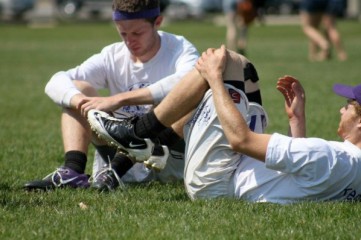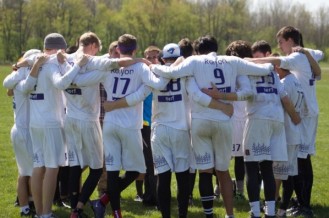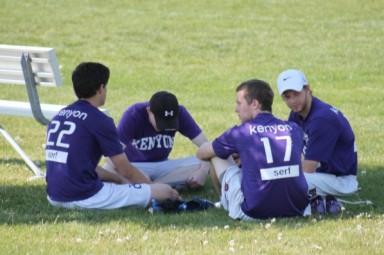On Saturday, May 19, 2012 at the USAU Division III College Championship in Appleton, WI, after being seeded 2nd overall at the tournament (never having dropped below 5th in either the USAU or the Skyd Magazine regular season power rankings), Kenyon College Serf was eliminated in the pre-quarters by the University of Puget Sound Postmen. Two senior captains had forewent attendance at graduation in favor of playing with our team. On that field, I held a teammate in my arms, both of us crying, for the first and only time in my life.
There’s nothing that brings together a team like winning. Nothing. You work and you work and you work and then you accomplish what you set out to accomplish and it validates all the sacrifices you made. Any doubts, any fears — they vanish.
 Serf swept through the Ohio Valley Regional championships undefeated and more or less unchallenged. After a tight Conference final matchup against Ohio Northern University (scoring three in a row in high winds to pull out the 10-9 victory), we put down Darkside authoritatively in the semis at Regionals (15-8) and went on to stomp Lehigh University in the finals.
Serf swept through the Ohio Valley Regional championships undefeated and more or less unchallenged. After a tight Conference final matchup against Ohio Northern University (scoring three in a row in high winds to pull out the 10-9 victory), we put down Darkside authoritatively in the semis at Regionals (15-8) and went on to stomp Lehigh University in the finals.
The team had two mantras, little jokey phrases we’d use to pump each other up. One was, “Don’t believe the hype.” Every profile on Skyd shared on Facebook, every tournament preview emailed to friends, every USAU rankings announcement retweeted with the addendum: “Don’t believe the hype.” But of course this was just an insincere way of very much believing the hype. How can you not? Being the beneficiary of hype is like winning without having to win. It’s just as addictive, but doesn’t require any of the work. Hype is hubris.
Maybe that’s unfair. We worked. We worked our asses off, all year long. In the gym, at practice. Poring over hours and hours of NGN footage, endless conversations over breakfast, lunch, and dinner about every imaginable aspect of this sport.
(Inconceivably, my girlfriend did not particularly enjoy this.)
For the majority of the tournaments that I played with Kenyon, we were the underdog — we’d come out hard against the top seeds in the early rounds, maybe get a big upset, maybe just make them play harder than they had wanted to. So when we, the top seed in our DIII pool, found ourselves losing at halftime to the energetic and aggressive Wake Forest WOMB, we were a bit stunned. We started our comeback but it was, as they say, too little, too late, and the round was over before we knew what had happened. In the second round, we beat Rochester Polytechnic Institute more out of anger at having lost to Wake than any self-generated drive to succeed.
Our third round of the day, the last game of pool play, pitted us against Carlton College GOP. When you are the one seed in your pool and GOP is the two seed, you want your record to be as pristine as possible. Of course, ours wasn’t, and GOP, with a sideline of what in my memory looks like 30 or 40 guys but of course was probably more like 20 in reality, was out, as they say, for blood.
I’ve never played a team like them. For me, GOP will always be the emblematic example of a team that is able to synthesize the focused intensity of high level ultimate with the irrepressible goofiness that seems so embedded in the culture of our sport. They’re the kind of team that, even when you’re gunning for a national title, you don’t really mind losing to. Again, I can’t think of another team like that, and I’m sure not everyone feels that way about GOP, but there it is.
Even coming third in our pool, we still had a shot at the championship. It was a long road to the finals and started not a half-hour after our loss to GOP, but it was there. “I need you to tell me that we can win this game,” I said to our coach. “Even if you don’t really believe that, I need to hear you say it.” He said something, but I didn’t hear it. We lost in pre-quarters to Puget Sound, and that was the end.
…
My first experience playing ultimate is probably fairly typical: barefoot, with no real idea of how many people were supposed to be on a team. I remember the first time I caught a disc over someone in the end zone — a bright, cold, early spring day in New Jersey. Sometime during the summer after my senior year of high school I came across a Sockeye highlight reel and watched Mike Caldwell do something incredible and bad-ass and from there ultimate was the only sport for me.
As much as I loved the game, for a long time I wasn’t very good. Really, not very good at all. And I was one of those players so blinded by enthusiasm for the game and for his teammates and his teammates’ skill that he cannot perceive his own lack thereof. I just didn’t appreciate the amount of work that those guys who were good, really good, put in outside of practice to get to be as dominant as they were. It was not until the end of my junior year that I saw things clearly. After regionals, I told my friend and captain Russell Wallack that I hadn’t been happy with my playing time. He told me that I hadn’t gotten a lot of playing time because, quite simply, I wasn’t really good enough to be relied on against the quality of opponents we were faced with.
That summer, I hit the weights multiple times a week. I ran sprints multiple times a week. With no one to throw with, I threw the same ten discs into a lacrosse goal over and over and over again, multiple times a week. I continued this regimen through the fall of my senior year. Upon our return from winter break, the team recognized my hard work by allowing me to serve as one of their captains and I loved them for it, but I wanted more. I wanted a championship.
Never before had I invested so much time, so much sacrifice into something, only to lose — to fail. When Puget Sound scored, a season’s worth of suppressed aches, pains, and injuries made themselves known all at once. My knees gave out. It must have happened, but I don’t remember lining up to shake their hands.
In 2011, at Club Nationals, Russ went down with a leg injury in the semis against Chain Lightning. He had to watch Ironside lose in the finals against Revolver from the sidelines. Then, a year later, Ironside were knocked out by Doublewide in the semis. Watching the NGN stream, there was a shot, just after Doublewide scored the winning point off a defensive miscommunication, of Russ, crouched down, completely broken.
“Don’t think a loss has ever hurt this bad,” he texted me.
While Russ was at Kenyon, we suffered some pretty bad defeats. But no matter what, Russ was always a fount of positivity. Every tournament, inevitably, we, as a team, would discuss the importance of mental toughness, of keeping the focus on ourselves and not our opponent, of supporting our teammates no matter what. When Russ graduated the team lost not only its best player but its leader, its heart. No one of us who were still at Kenyon could have possibly filled the void on our own, and so a number of us attempted to do so collectively — I would count myself as one of these.
We struggled a lot at Kenyon with the question of “outcome goals” — what should they be, how much should we focus on them, to what extent should we allow them to dictate the course of our season. “This is the first time in 11 years of ultimate that I was so focused on an outcome goal,” Russ said of this season with Ironside. “I felt it in every practice. We all knew that we were the best team in the country. What we were unsure of was whether we could deliver on that potential when it mattered. For me this made every mistake a frustration, it made sloppy practices more of an issue than ever before. Simply put, I had incredible expectations for myself and my teammates, and it meant that anything but a title would be failure.”
The question of outcome goals is also the question of playing to win as opposed to playing to have fun. When you’re simply playing to have fun — in a pickup game, say, or a casual summer league — losing, quite literally, doesn’t matter. The issue of winning or losing simply never enters into it. There’s no need for it. This is not to say you can’t strive to play well, and moreover this isn’t to say that it’s wholly inappropriate to feel annoyed when you lose, but losing in this context simply doesn’t provoke the same feelings.
When a whole season ends in failure, it is, to put it mildly, soul-crushing. It doesn’t matter what level you’re playing at. “When you go into a game expecting to win, and feeling that its outcome justifies your hard work, it really does not matter what the game is ‘for,’” Russ said. “It is going to suck to lose.”
For a long time, I couldn’t really talk about Nationals. People would ask me, “What happened?” and I would maybe try to manage a laugh and toss of some remark about underperforming but it was always an evasion. The honest truth is that I don’t really know what happened with Serf at Nationals. Adrian Galbraith-Paul, the other senior and captain who skipped graduation with me to play at Nationals, packed up our rooms and drove back east together from Gambier, OH for the last time. It’s a long drive from Gambier to Philadelphia. “On Saturday morning, we wanted it to already be Sunday afternoon,” he said of the DIII championship. “We didn’t want to have to play our way through the weekend.” After a whole season of performing at a relatively high level, we didn’t want to have to finish strong. Maybe we were burnt out. Maybe we peaked at Regionals and couldn’t stay there. Maybe we just really shouldn’t have believed the hype.
Our other mantra on SERF last year: “If you’re sick, you’re sick.” It started as an off-the-cuff remark at a team meeting — absurdist swagger. After our collapse at Nationals, however, it took on a new meaning, at least for me. Success isn’t determined by whether or not you accomplish your outcome goals. If you’re sick, you’re just sick. Work your ass off. Show up at practice early and stay late. Lift. Eat enough. Sleep enough. Run your sprints. Do your yoga, take care of your body. Study the game. If you’re sick, you’re sick.
Maybe this is just a way to justify losing. No, scratch that, this very much is a way to justify losing. It seems to me now that there is value to losing, and not only because it punishes us for taking winning for granted. Losing so spectacularly at Nationals reminded me that the value of my experience with Serf ultimately had nothing to do with what happened on the field — what happened on the field merely showed me the value of my experience with Serf. Winning a national championship wasn’t what was going to make me grow as a person, what taught me about other people, about how to be both a good leader and a good teammate — all the truistic stuff about sports that really does happen from time to time no matter how cynical we want to be about it.
The event of winning or losing a national championship only takes place over the course of a weekend, but the things I learned and felt with Serf took far longer. They happened over the course of a whole season — four seasons, in fact. I wonder, now, if I would be able to appreciate that as much as I do if we had won.










Comments Policy: At Skyd, we value all legitimate contributions to the discussion of ultimate. However, please ensure your input is respectful. Hateful, slanderous, or disrespectful comments will be deleted. For grammatical, factual, and typographic errors, instead of leaving a comment, please e-mail our editors directly at editors [at] skydmagazine.com.